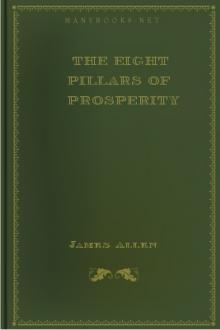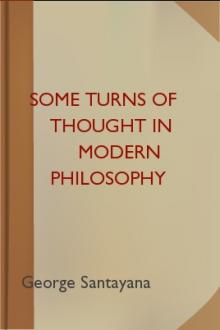The Eight Pillars of Prosperity - James Allen (top rated books of all time txt) 📗

- Author: James Allen
- Performer: -
Book online «The Eight Pillars of Prosperity - James Allen (top rated books of all time txt) 📗». Author James Allen
These eight principles, then, in greater or lesser degree, are the causative factors in all success of whatsoever kind. Underneath all prosperity they are the strong supports, and, howsoever appearances may be against such a conclusion, a measure of them informs and sustains every effort which is crowned with that excellence which men name success.
It is true that comparatively few successful men practice, in their entirety and perfection, all these eight principles, but there are those who do, and they are the leaders, teachers, and guides of men, the supports of human society, and the strong pioneers in the van of human evolution.
But while few achieve that moral perfection which ensures the acme of success, all lesser successes come from the partial observance of these principles which are so powerful in the production of good results that even perfection in any two or three of them alone is sufficient to ensure an ordinary degree of prosperity, and maintain a measure of local influence at least for a time, while the same perfection in two or three with partial excellence in all, or nearly all, the others, will render permanent that limited success and influence which will, necessarily, grow and extend in exact ratio with a more intimate knowledge and practice of those principles which, at present, are only partially incorporated in the character.
The boundary lines of a man’s morality mark the limits of his success. So true is this that to know a man’s moral status would be to know - to mathematically gauge - his ultimate success or failure. The temple of prosperity only stands in so far as it is supported by its moral pillars; as they are weakened, it becomes insecure; in so far as they are withdrawn, it crumbles away and totters to ruin.
Ultimate failure and defeat are inevitable where moral principles are ignored or defied - inevitable in the nature of things as cause and effect. As a stone thrown upward returns to the earth, so every deed, good or bad, returns upon him that sent it forth. Every unmoral or immoral act frustrates the end at which it aims, and every such succeeding act puts it further and further away as an achieved realisation. On the other hand, every moral act is another solid brick in the temple of prosperity, another round of strength and sculptured beauty in the pillars which support it.
Individuals, families, nations grow and prosper in harmony with their growth in moral strength and knowledge; they fall and fail in accordance with their moral decadence.
Mentally, as physically, only that which has form and solidity can stand and endure. The unmoral is nothingness, and from it nothing can be formed. It is the negation of substance. The immoral is destruction. It is the negation of form. It is a process of spiritual denudation. While it undermines and disintegrates, it leaves the scattered material ready for the wise builder to put it into form again; and the wise builder is Morality. The moral is substance, form, and building power in one. Morality always builds up and preserves, for that is its nature, being the opposite of immorality, which always breaks down and destroys. Morality is the master-builder everywhere, whether in individuals or nations.
Morality is invincible, and he who stands upon it to the end, stands upon an impregnable rock, so that his defeat is impossible, his triumph certain. He will be tried, and that to the uttermost, for without fighting there can be no victory, and so only can his moral powers be perfected, and it is in the nature of fixed principles, as of everything finely and perfectly wrought, to have their strength tested and proved. The steel bars which are to perform the strongest and best uses in the world must be subjected to a severe strain by the ironmaster, as a test of their texture and efficiency, before they are sent from his foundry. The brickmaker throws aside the bricks which have given way under the severe heat. So he who is to be greatly and permanently successful will pass through the strain of adverse circumstances and the fire of temptation with his moral nature not merely not undermined, but strengthened and beautified. He will be like a bar of well-wrought steel, fit for the highest use, and the universe will see, as the ironmaster his finely-wrought steel, that the use does not escape him.
Immorality is assailable at every point, and he who tries to stand upon it, sinks into the morass of desolation. Even while his efforts seem to stand, they are crumbling away. The climax of failure is inevitable. While the immoral man is chuckling over his ill-gotten gains, there is already a hole in his pocket through which his gold is falling. While he who begins with morality, yet deserts it for gain in the hour of trial, is like the brick which breaks on the first application of heat; he is not fit for use, and the universe casts him aside, yet not finally, for he is a being, and not a brick; and he can live and learn, can repent and be restored.
Moral force is the life of all success, and the sustaining element in all prosperity; but there are various kinds of success, and it is frequently necessary that a man should fail in one direction that he may reach up to a greater and more far-reaching success. If, for instance, a literary, artistic, or spiritual genius should begin by trying to make money, it may be, and often is, to his advantage and the betterment of his genius that he should fail therein, so that he may achieve that more sublime success wherein lies his real power. Many a millionaire would doubtless be willing to barter his millions for the literary success of a Shakespeare or the spiritual success of a Buddha, and would thereby consider that he had made a good bargain. Exceptional spiritual success is rarely accompanied with riches, yet financial success cannot in any way compare with it in greatness and grandeur. But I am not, in this book, dealing with the success of the saint or spiritual genius but with that success which concerns the welfare, well-being, and happiness of the broadly average man and woman, in a word, with the prosperity which, while being more or less connected with money - being present and temporal - yet is not confined thereto, but extends to and embraces all human activities, and which particularly relates to that harmony of the individual with his circumstances which produces that satisfaction called happiness and that comfort known as prosperity. To the achievement of this end, so desirable to the mass of mankind, let us now see how the eight principles operate, how the roof of prosperity is raised and made secure upon the pillars by which it is supported.
Chapter 2. First pillar - Energy
Energy is the working power in all achievement. Inert coal it converts into fire, and water it transmutes into steam; it vivifies and intensifies the commonest talent until it approaches to genius, and when it touches the mind of the dullard, it turns into a living fire that which before was sleeping in inertia.
Energy is a moral virtue, its opposing vice being laziness. As a virtue, it can be cultivated, and the lazy man can become energetic by forcibly arousing himself to exertion. Compared with the energetic man, the lazy man is not half alive. Even while the latter is talking about the difficult of doing a thing, the former is doing it. the active man has done a considerable amount of work before the lazy man has roused himself from sleep. While the lazy man is waiting for an opportunity, the active man has gone out, and met and utilized half a dozen opportunities. He does things while the other is rubbing his eyes.
Energy is one of the primary forces: without it nothing can be accomplished. It is the basic element in all forms of action. The entire universe is a manifestation of tireless, though inscrutable energy. Energy is, indeed, life, and without it there would be no universe, no life. When a man has ceased to act, when the body lies inert, and all the functions have ceased to act, then we say he is dead; and in so far as a man fails to act, he is so far dead. Man, mentally and physically, is framed for action, and not for swinish ease. Every muscle of the body (being a lever for exertion) is a rebuke to the lazy man. Every bone and nerve is fashioned for resistance; every function and faculty is there for a legitimate use. All things have their end in action; al things are perfected in use.
This being so, there is no prosperity for the lazy man, no happiness, no refuge and no rest; for him, there is not even the ease which he covets, for he at last becomes a homeless outcast, a troubled, harried, despised man, so that the proverb wisely puts it that “The lazy man does the hardest work”, in that, avoiding the systematic labour of skill, he brings upon himself the hardest lot.
Yet energy misapplied is better than no energy at all. This is powerfully put by St. John in the words: “I would have you either hot or cold; if you are lukewarm I will spew you out of my mouth”. The extremes of heat and cold here symbolize the transforming agency of energy, in its good and bad aspects.
The lukewarm stage is colourless, lifeless, useless; it can scarcely be said to have either virtue or vice, and is merely barren empty, fruitless. The man who applies his abounding energy to bad ends, has, at the very power with which the strives to acquire his selfish ends, will bring upon him such difficulties, pains, and sorrows, that will compel him to learn by experience, and so at last to re-fashion his base of action. At the right moment, when his mental eyes open to better purposes, he will turn round and cut new and proper channels for the outflow of his power, and will then be just as strong in good as he formerly was in evil. This truth is beautifully crystallized in the old proverb, “The greater the sinner, the great the saint”.
Energy is power, and without it there will be no accomplishment; there will not even be virtue, for virtue does not only consist of not doing evil, but also, primarily, of doing good. There are those who try, yet fail through insufficient energy. Their efforts are too feeble to produce positive results. Such are not vicious, and because they never do any deliberate harm, are usually spoken of as good men that fail. But to lack the initiative to do harm is not to be good; it is only to be weak and powerless. He is the truly good man who, having the power to do evil, yet chooses to direct his energies in ways that are good. Without a considerable degree of energy, therefore, there will be no moral power. What good there is, will be latent and sleeping; there will be no going forth of good, just as there can be no mechanical motion without the motive power.
Energy is the





Comments (0)